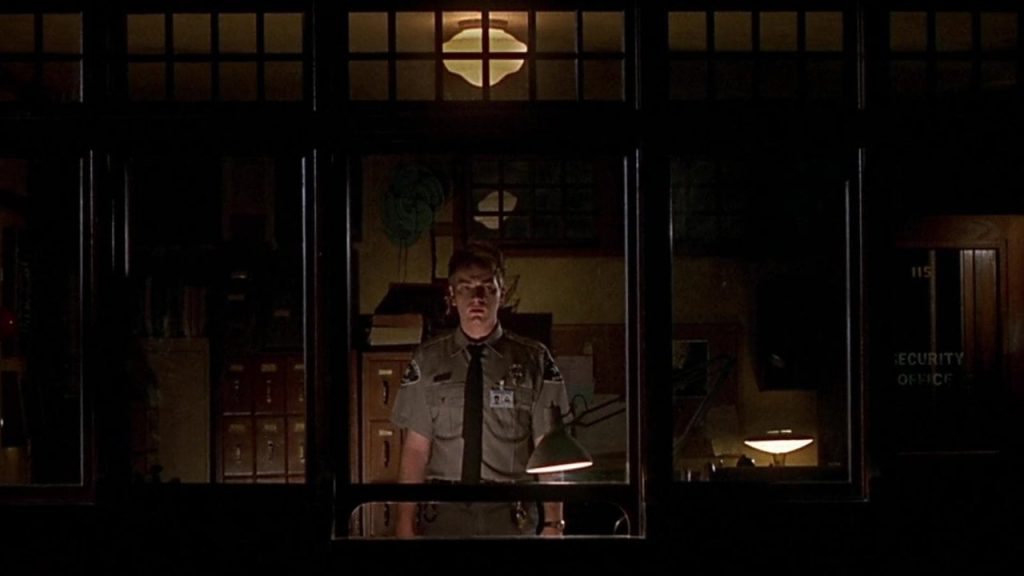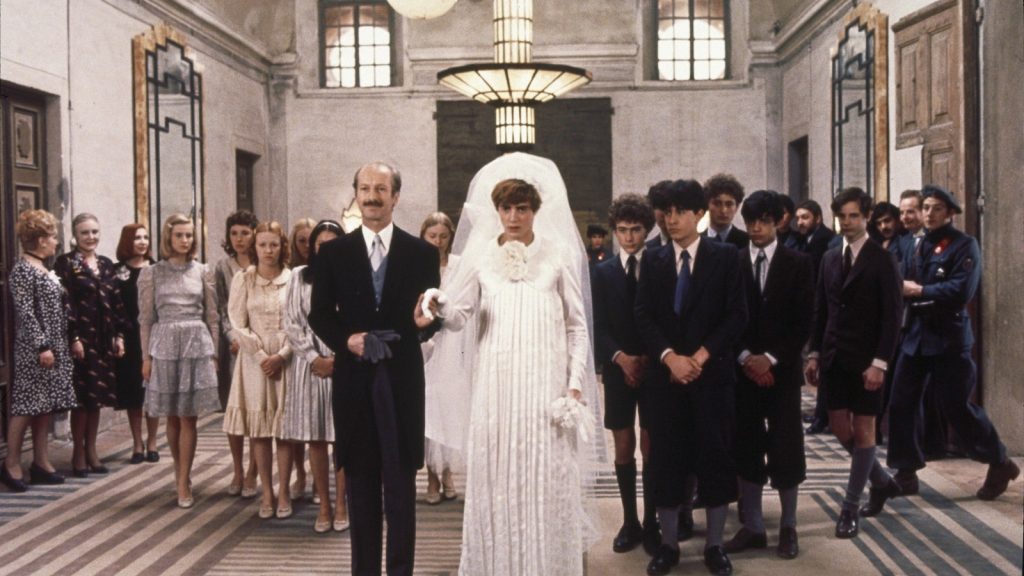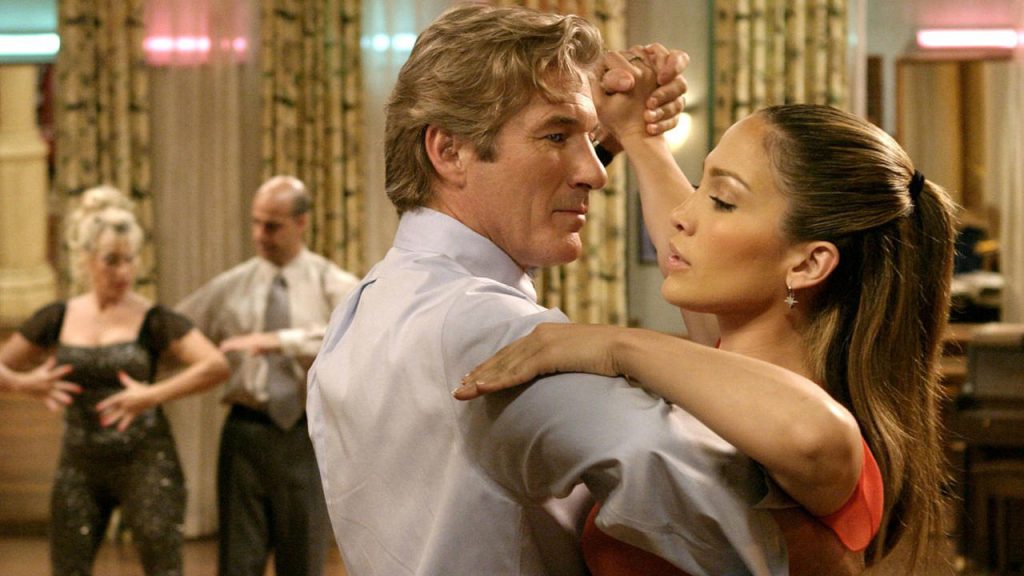Welcome to Harvey’s Hellhole, a monthly column devoted to spotlighting the movies that were poorly marketed, mishandled, reshaped, neglected or just straight-up destroyed by Harvey Weinstein during his reign as one of the most powerful studio chiefs in Hollywood. This month, let’s go back twenty-five years ago, when Harvey finally dumped a long-delayed horror remake, and no one noticed.
I still remember when Nightwatch was supposed to come out in 1996. I was the film editor for a Black-owned arts and entertainment rag in Texas. I received the fall press packages from all the studios and Nightwatch, scheduled for an October release, was part of the Miramax bushel. Released through brother Bob’s Dimension Films company, NIghtwatch seemed like an obvious hot ticket for the Halloween season. Ewan McGregor, fresh off his lead turn as the main junkie in Miramax’s summer hit Trainspotting, would be headlining his first U.S. film, a stateside remake of Danish filmmaker Ole Bornedal’s creepy-ass 1994 thriller. Bornedal would once again handle the directing duties.
The original movie — titled Nattevagten back in Denmark — was a big hit in its homeland. It never had a proper theatrical release over here, playing several stateside film festivals (including Sundance) in 1995 before the Weinsteins snapped up the U.S. rights and kept it shelved, making the remake the only available version for U.S audiences. Americans who got to see the original did appreciate the thrills. When it played the Miami Film Festival, Miami Herald critic Rene Rodriguez wrote, “The movie is pure Hitchcock at heart … with plenty of gore and gristle on the side.” (Although Anchor Bay eventually released it on DVD in 2001, it’s currently unavailable online. A colleague of mine recently sent me a link to a Russian streaming site that has it. Unfortunately, the subtitles are in Russian.)
In Nattevagten, a young Nikolaj Coster-Waldau plays the role McGregor (whose American accent does not work at all) fills in the remake: a law student who takes a job as a morgue night-watchman. When a necrophiliac serial killer starts defiling bodies during the kid’s shift, it isn’t long before he’s accused of the killing and defiling. McGregor’s clueless protagonist is surrounded by many possible culprits, including his sociopathic best pal (Josh Brolin), a dickhead doctor (Brad Dourif), a haggard inspector (Nick Nolte) and his quiet partner (an uncredited John C. Reilly). All the while, his girlfriend (Patricia Arquette) is around, doing girlfriend shit until she’s put in danger in the final, chaotic act.
Eventually, Nightwatch would be pushed back to November. Then, it got pushed back to September 1997 and, once again, the following October. Finally, after almost two years, it slipped into theaters in April 1998, with little to no publicity. As expected, the reviews were less than favorable. “It’s a visually effective and often scary film to watch,” wrote Roger Ebert, “but the story is so leaky that we finally just give up: Scene after scene exists only to toy with us and prop up the impossible plot.” Ultimately, the $10 million flick only made $1.3 million at the box office.

As you might’ve suspected, the delays were brought on by reshoots. Thanks to not-so–enthusiastic test screenings, the Weinstein bros ordered some changes, including downsizing Lauren Graham’s role as Brolin’s long-suffering girlfriend (although she shares top billing with McGregor, Arquette, Brolin, and Nolte, she’s only in a couple of scenes) and demanding a more satisfying finale (the reshot ending, which features McGregor wearing an obvious wig, is certainly better than this cheesy, alternate finale). Some salacious scenes from the original were also sanitized for viewers’ protection. There’s a scene where McGregor gets a handjob from a hooker in a swanky restaurant, a more farcical alternative to the blowjob Coster-Waldau gets from a hooker in a swanky restaurant in the original.
People both behind and in front of the camera had their issues with the whole thing. According to the book Nordic Genre Film: Small Nation Film Genres in the Global Marketplace, Bornedal had a blast during principal photography, but things changed once post-production started and you-know-who showed up. Steven Soderbergh, who was brought in to Americanize the script, wrote in his book Getting Away With It: Or: The Further Adventures of the Luckiest Bastard You Ever Saw that he was getting frustrated with penning new script pages for the reshoots. “Ole keeps making changes that are detrimental to the picture,” he wrote, “and I keep sending out faxes chock-full of cranky opinions and reactions.” (He was responsible for this meta bit of dialogue from McGregor: “It’s just like one of those movies on the USA Network – the hero sees something weird and no one will believe him.”)
The cast was also fed up with the delays, the reshoots, and the mishandling. When an interviewer for the long-gone magazine Jane asked Brolin about his role, he started off by saying, “God, I forget.” Even McGregor said in a 2005 interview that the movie could’ve worked if Harvey and them didn’t come in and Weinstein it all to hell. “[Bornedal] did just film it frame-by-frame like the original and he should have brought something else to it,” he said, “but then Miramax started fucking around with the end and they took all the interesting things out of the movie. So Nightwatch ended up a kind of slightly spooky but bland movie, whereas the original is really weird and terrifying.”
By the time Nightwatch was released, McGregor had already starred in several films (including the offbeat heist film A Life Less Ordinary, where he reunited with Trainspotting director Danny Boyle) and was on his way to playing Obi-Wan Kenobi in the Star Wars prequels. Bornedal and Soderbergh also had moved on. Both of them were even hired by Harvey to work with Guillermo del Toro on Mimic, another tinkered-with Dimension release. But while Soderbergh went on to become a popular, influential, American filmmaker, Bornedal returned to making thrillers in his homeland. (McGregor said he once bumped into Nolte, who informed McGregor that Bornedal went back to Denmark “with his tail between his fucking legs.”)
Bornedal wasn’t the only foreign filmmaker who was brought over to Hollywood in the ‘90s to direct a botched version of his own successful thriller. The late Dutch director George Sluzier did a notoriously sunnier remake of his bleak 1988 chiller The Vanishing in 1993, which was trashed by critics and failed at the box office. (Production halted on his follow-up, Dark Blood, when star River Phoenix died in 1993. A stitched-together version was shown at several festivals in 2012.) But, unlike Sluzier, Bornedal didn’t completely write Hollywood off. In 2008, he let LA-based Mandate Pictures pick up the remake rights to two of his Danish films, The Substitute and Just Another Love Story. Those remakes didn’t happen, but Sam Raimi, who was going to produce Substitute, got Bornedal to direct the 2012 supernatural flick The Possession. It took the top spot in its opening weekend, and ended up grossing $82 million.
Apparently, Bornedal still believed he could make a successful thriller here in the States. He just made sure Harvey Weinstein had nothing to do with it.
“Nightwatch” is currently streaming on Pluto TV.



